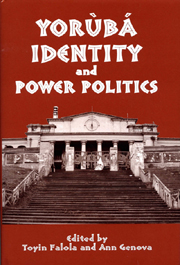Book contents
- Frontmatter
- Contents
- List of Illustrations
- Introduction
- Part I Writing Yorùbá
- 1 The Yorùbá Nation
- 2 Oral Tradition and the Reconstruction of Yorùbá Dress
- 3 Diaries as Cultural and Intellectual Histories
- 4 Historiography of Western Yorùbá Borderlands
- 5 The History of the Okun Yorùbá: Research Directions
- 6 Ìlá Kingdom Revisited: Recent Archaeological Research at Ìlá-Yàrà
- 7 Early Ìjѐbú History: An Analysis on Demographic Evolution and State Formation
- Part II Chiefs and Tradition
- Part III Identity and Modern Politics
- Notes on the Contributors
- Index
5 - The History of the Okun Yorùbá: Research Directions
from Part I - Writing Yorùbá
Published online by Cambridge University Press: 12 September 2012
- Frontmatter
- Contents
- List of Illustrations
- Introduction
- Part I Writing Yorùbá
- 1 The Yorùbá Nation
- 2 Oral Tradition and the Reconstruction of Yorùbá Dress
- 3 Diaries as Cultural and Intellectual Histories
- 4 Historiography of Western Yorùbá Borderlands
- 5 The History of the Okun Yorùbá: Research Directions
- 6 Ìlá Kingdom Revisited: Recent Archaeological Research at Ìlá-Yàrà
- 7 Early Ìjѐbú History: An Analysis on Demographic Evolution and State Formation
- Part II Chiefs and Tradition
- Part III Identity and Modern Politics
- Notes on the Contributors
- Index
Summary
This chapter concentrates largely on the Owe, Oworo, and Bunu (including Ikiri), the Yorùbá speakers closest to the Niger–Benue confluence. In examining the evidence available to me on these groups, I became aware of a number of themes and questions, which I present here with the intention of stimulating discussion on the directions in which the study of these Yorùbá speakers, and of the north-east (or Okun) Yorùbá in general, could profitably proceed.
The first point that needs to be made is that the history of the Okun groups (Owe, Oworo, Bunu, Ijumu, and Yagba) has been sadly neglected. The second is that, given the themes and questions discussed herein, it is clear that the history of the Okun Yorùbá is of considerable importance, not just to local history, but to the study of history on a broader scale.
One theme that arises from a study of available works on the Okun concerns Yorùbá origins. It seems likely, for example, that the Owe, Oworo, and Bunu have inhabited the area near the confluence for a considerable length of time. Are the Okun Yorùbá, indeed, to be regarded as the “proto-Yorùbá,” indigenous people still adhering to the type of political organization that originally characterized the whole Yorùbá language group, as Robert Smith suggests? Are “the ultimate origins of the Yorùbá-speaking peoples… located not very far from the Niger–Benue confluence area,” as Ade Obayemi suggested?
- Type
- Chapter
- Information
- Yorùbá Identity and Power Politics , pp. 111 - 126Publisher: Boydell & BrewerPrint publication year: 2006



